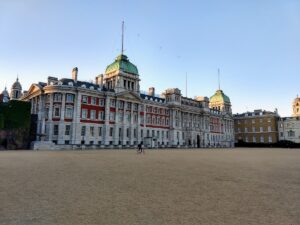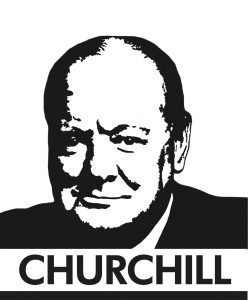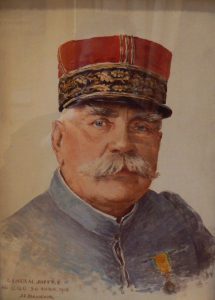
Finest Hour 182
November 11, 1918: The Hour of Deliverance
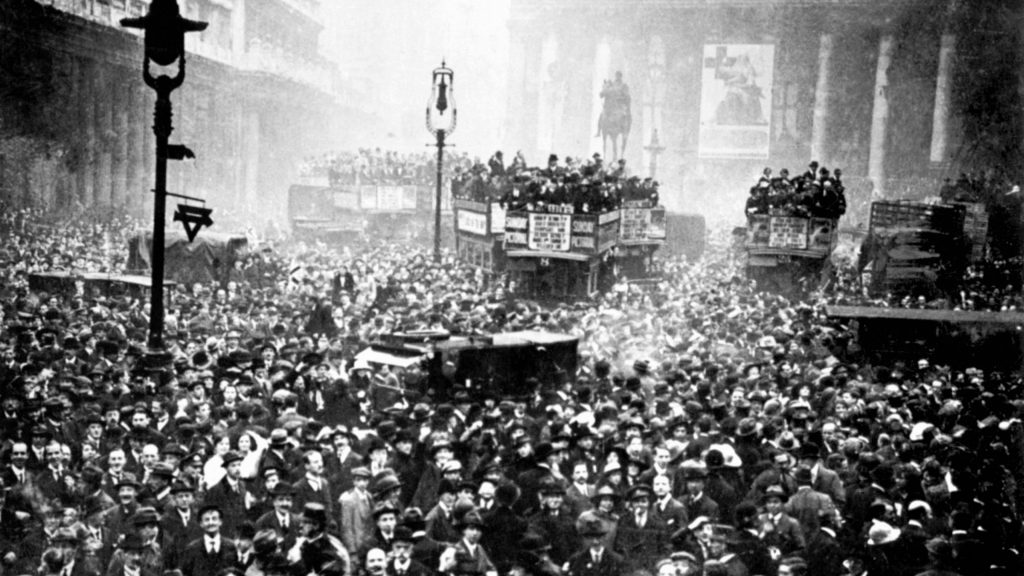
March 14, 2019
Finest Hour 182, Fall 2018
Page 30
In his memoirs of the First World War published as The World Crisis, Winston Churchill vividly recalls the scene he witnessed at the moment the Armistice took effect.
I t was a few minutes before the eleventh hour of the eleventh day of the eleventh month. I stood at the window of my room looking up Northumberland Avenue towards Trafalgar Square, waiting for Big Ben to tell that the War was over. My mind strayed back across the scarring years to the scene and emotions of the night at the Admiralty when I listened for these same chimes in order to give the signal of war against Germany to our Fleets and squadrons across the world. And now all was over! The unarmed and untrained island nation, who with no defence but its Navy had faced unquestioningly the strongest manifestation of military power in human record, had completed its task. Our country had emerged from the ordeal alive and safe, its vast possessions intact, its war effort still waxing, its institutions unshaken, its people and Empire united as never before. Victory had come after all the hazards and heartbreaks in an absolute and unlimited form. All the Kings and Emperors with whom we had warred were in flight or exile. All their Armies and Fleets were destroyed or subdued. In this Britain had borne a notable part, and done her best from first to last.
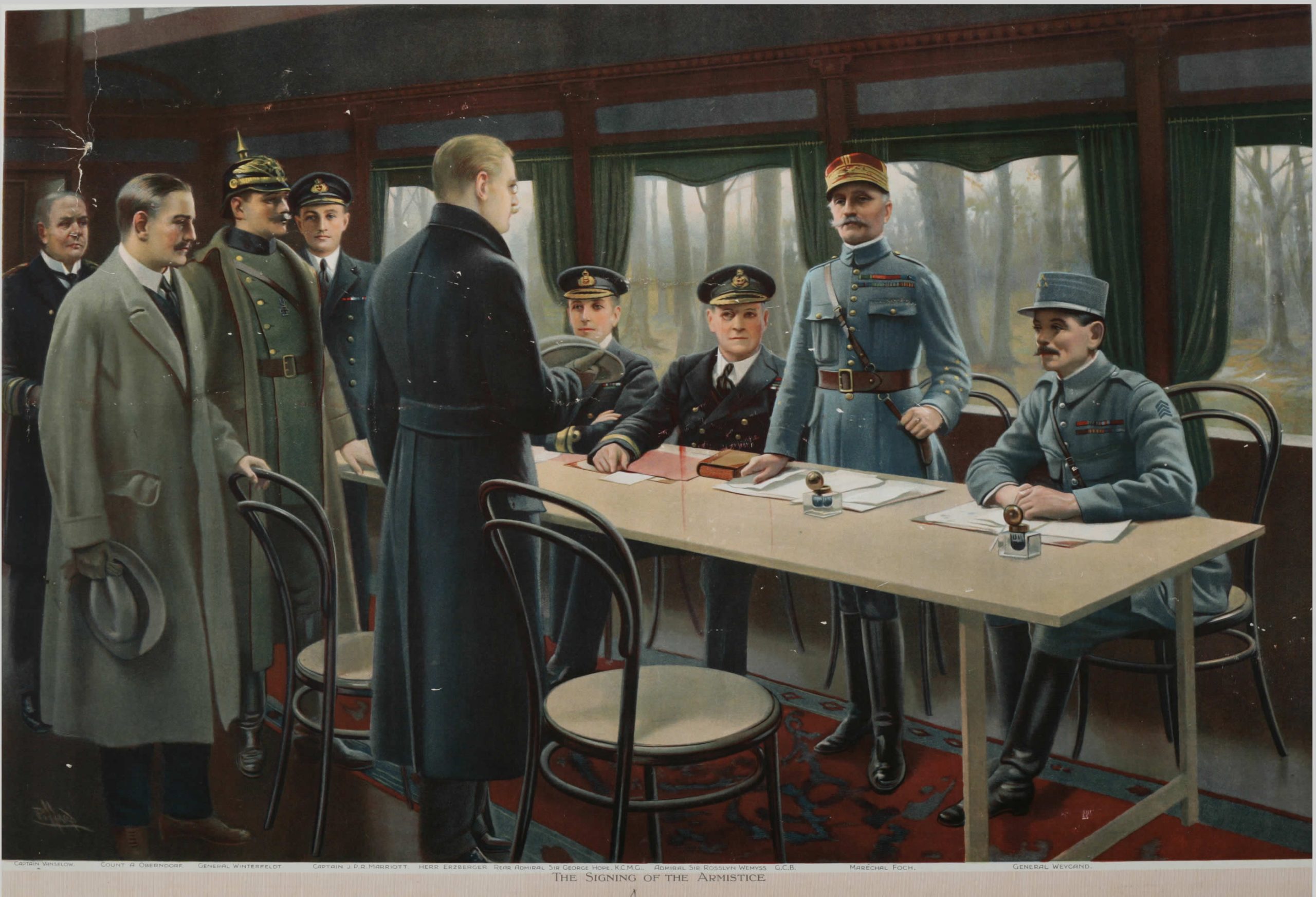
The minutes passed. I was conscious of reaction rather than elation. The material purposes on which one’s work had been centred, every process of thought on which one had lived, crumbled into nothing. The whole vast business of supply, the growing outputs, the careful hoards, the secret future plans—but yesterday the whole duty of life—all at a stroke vanished like a nightmare dream, leaving a void behind. My mind mechanically persisted in exploring the problems of demobilization. What was to happen to our three million Munition workers? What would they make now? How would the roaring factories be converted? How in fact are swords beaten into ploughshares? How long would it take to bring the Armies home? What would they do when they got home? We had of course a demobilization plan for the Ministry of Munitions. It had been carefully worked out, but it had played no part in our thoughts. Now it must be put into operation. The levers must be pulled—Full Steam Astern. The Munitions Council must meet without delay

2024 International Churchill Conference
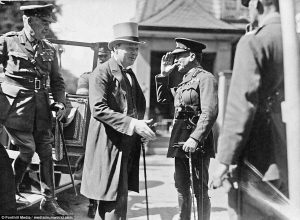
And then suddenly the first stroke of the chime. I looked again at the broad street beneath me. It was deserted. From the portals of one of the large hotels absorbed by Government Departments darted the slight figure of a girl clerk, distractedly gesticulating while another stroke of Big Ben resounded. Then from all sides men and women came scurrying into the street. Streams of people poured out of all the buildings. The bells of London began to clash. Northumberland Avenue was now crowded with people in hundreds, nay, thousands, rushing hither and thither in a frantic manner, shouting and screaming with joy. I could see that Trafalgar Square was already swarming. Around me in our very headquarters, in the Hotel Metropole, disorder had broken out. Doors banged. Feet clattered down corridors. Everyone rose from the desk and cast aside pen and paper. All bounds were broken. The tumult grew. It grew like a gale, but from all sides simultaneously. The street was now a seething mass of humanity. Flags appeared as if by magic. Streams of men and women flowed from the Embankment. They mingled with torrents pouring down the Strand on their way to acclaim the King. Almost before the last stroke of the clock had died away, the strict, war-straitened, regulated streets of London had become a triumphant pandemonium. At any rate it was clear that no more work would be done that day. Yes, the chains which had held the world were broken. Links of imperative need, links of discipline, links of brute force, links of self-sacrifice, links of terror, links of honour which had held our nation, nay, the greater part of mankind, to grinding toil, to a compulsive cause—every one had snapped upon a few strokes of the clock. Safety, freedom, peace, home, the dear one back at the fireside— all after fifty-two months of gaunt distortion. After fifty-two months of making burdens grievous to be borne and binding them on men’s backs, at last, all at once, suddenly and everywhere the burdens were cast down. At least so for the moment it seemed.
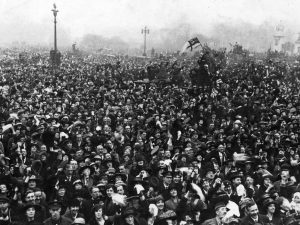
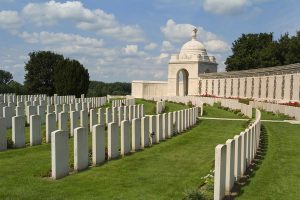
My wife arrived, and we decided to go and offer our congratulations to the Prime Minister, on whom the central impact of the home struggle had fallen, in his hour of recompense. But no sooner had we entered our car than twenty people mounted upon it, and in the midst of a wildly cheering multitude we were impelled slowly forward through Whitehall. We had driven together the opposite way along the same road on the afternoon of the ultimatum. There had been the same crowd and almost the same enthusiasm. It was with feelings which do not lend themselves to words that I heard the cheers of the brave people who had borne so much and given all, who had never wavered, who had never lost faith in their country or its destiny, and who could be indulgent to the faults of their servants when the hour of deliverance had come.
Subscribe
WANT MORE?
Get the Churchill Bulletin delivered to your inbox once a month.
